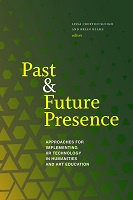Past and Future Presence
Approaches for Implementing XR Technology in Humanities and Art Education
Contributor(s)
Crofton-Sleigh, Lissa (editor)
Beams, Brian (editor)
Language
EnglishAbstract
While uses and studies of XR technology within STEM-based education have been plentiful in recent years, there has been lesser or even, at times, a lack of coverage for this novel learning tool in the arts and humanities.Past and Future Presence aims to bridge some of that gap by presenting research-based theory and case studies of successful application and implementation of XR technology into postsecondary educational settings, ranging in topics from ancient to modern languages, classical and contemporary art, and reenvisioned historical scenes and events presented in ways never seen before. The studies also contemplate how this novel medium can enhance and supplement learning in classrooms and other formal or informal learning environments. The volume as a whole is intended to demonstrate to educators, scholars, and researchers in higher education the potential value of integrating XR technology into their classrooms and to provide a strong argument for college and university administrators to invest in training and development of new research and content for classrooms inside and outside of STEM. The authors of these chapters come from a diverse range of backgrounds at different stages of their careers, providing a broad crosssection of scholastic work within the humanities and arts. Each chapter offers a different angle or approach to incorporating XR technology into teaching or research within different subject areas. As the volume suggests, this technology also places additional emphasis on the humanity within the humanities, by focusing on increasing connection between users and different cultures, time periods, and perspectives.
Keywords
Information technology: general topics;Virtual worlds;Teaching of a specific subjectDOI
10.3998/mpub.14371789ISBN
9781943208692, 9781943208708Publisher
Amherst College PressPublisher website
https://acpress.amherst.edu/Publication date and place
2024Classification
Information technology: general topics
Virtual worlds
Teaching of a specific subject


 Download
Download